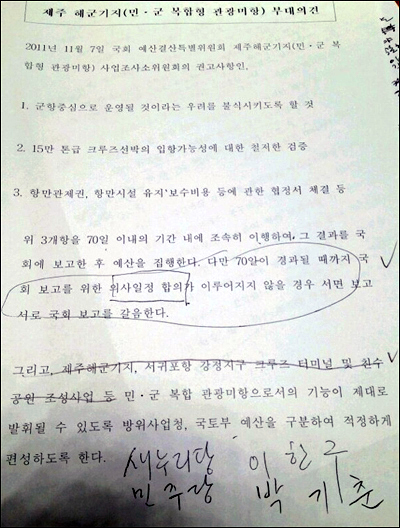See the Gangjeong villagers’ statement on budget on Jan. 2 and related National Assembly subsidiary conditions under the below photos.
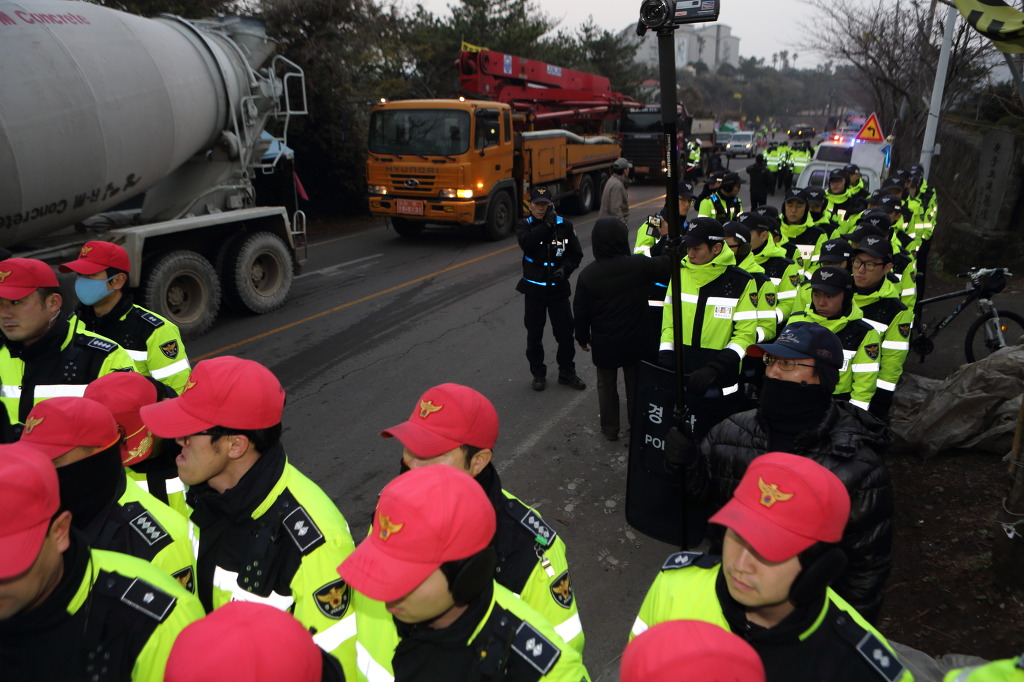
Photo by Cho Sung-Bong/ The sirens rang about three times even before 7 am on Jan. 2, 2013. The siren rang around 9 am again. The daily war of Gangjeong started again. Despite the National Assembly stipulation on 70 days, the navy enforced construction even on the New Year holiday.

Photo by Cho Sung-Bong/ Mayor Kang Dong-Kyun protested to the police for their permission on the entry of construction trucks, showing them the National Assembly condition. For the National Assembly conditions, see the below.
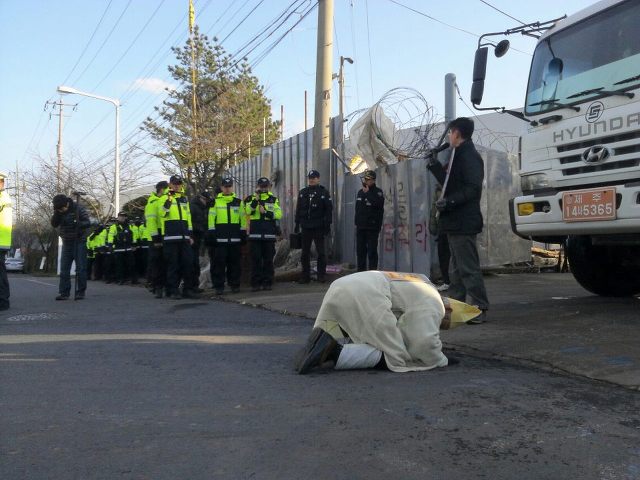
Photo by Kang U-Jin/ Around 4 pm. Jan. 2/ Some people including Prof. Shin Yong-In staged a civil disobedience movement, demanding the navy’s observance on the National Assembly conditions.
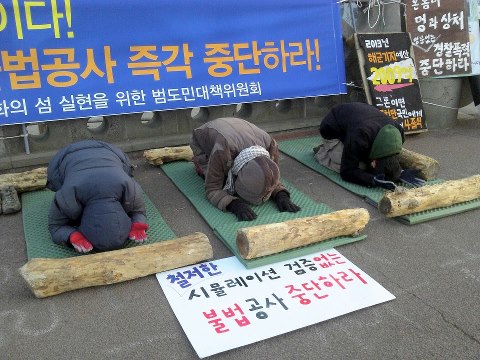
Photo by Paco Booyah/ 5 p.m. Jan. 3. 100 bows in front of the destruction site. The sign reads, “Stop the illegal construction without a through verification on simulation.’
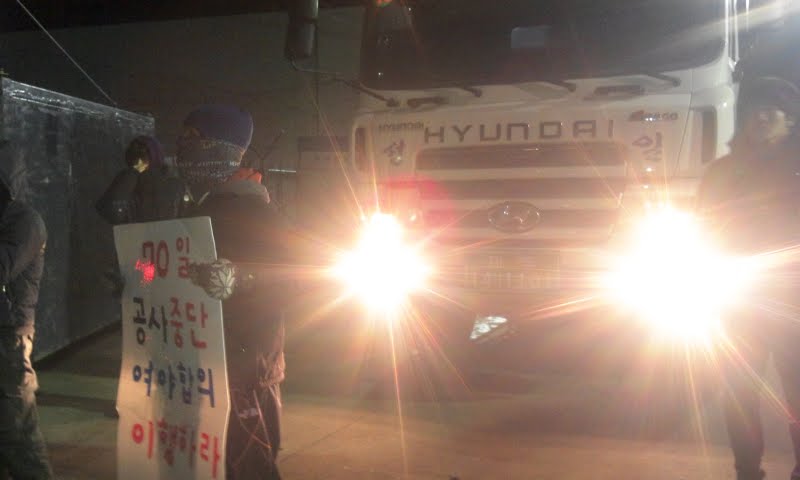
[Around 9pm, Jan. 3]/ A cold night. A young man in his 30s stops a construction truck alone. The police threaten him that they would arrest him under the charge of ‘obstruction on business.’ The young man protests in state asking why the police ignore 70 days’ verification and construction stop period, while the police siding with the navy that enforces construction, despite the National Assembly subsidiary opinion. The young man had to fight himself enduring a cold night alone in front of the gate. Behind a sheet of paper by the National assembly, Gangjeong is bleeding again…
The sign reads, ‘Construction stop for 70 days! Carry the [National Assembly] agreement by the ruling and opposition parties!’
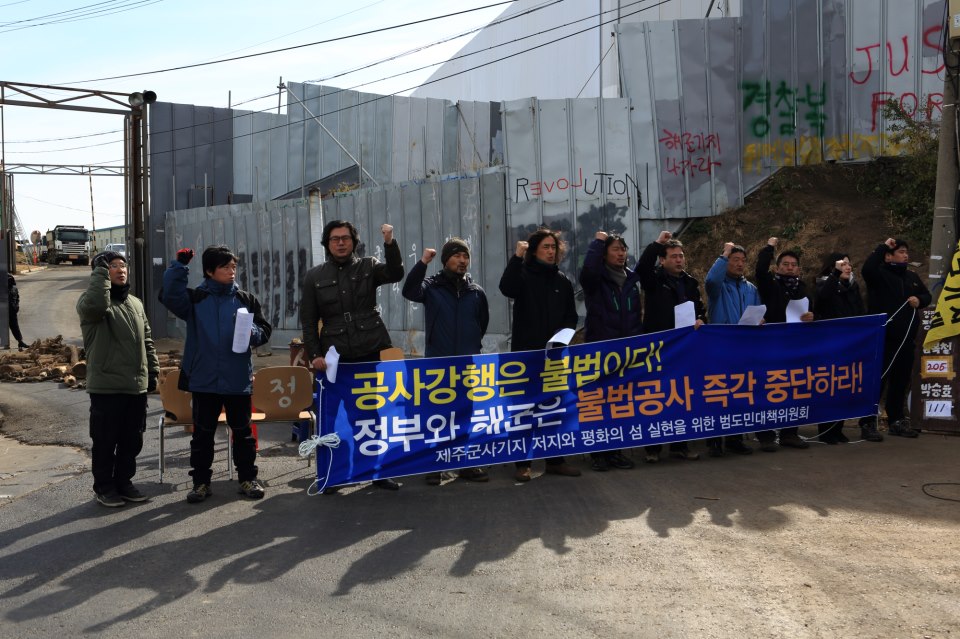
Photo by Cho Sung-Bong/ The Pan-Island committee press conference on Jan. 3/ The banner reads ‘The enforcement of construction is illegal. The government and navy should immediately stop illegal construction!’ For more photos, see here
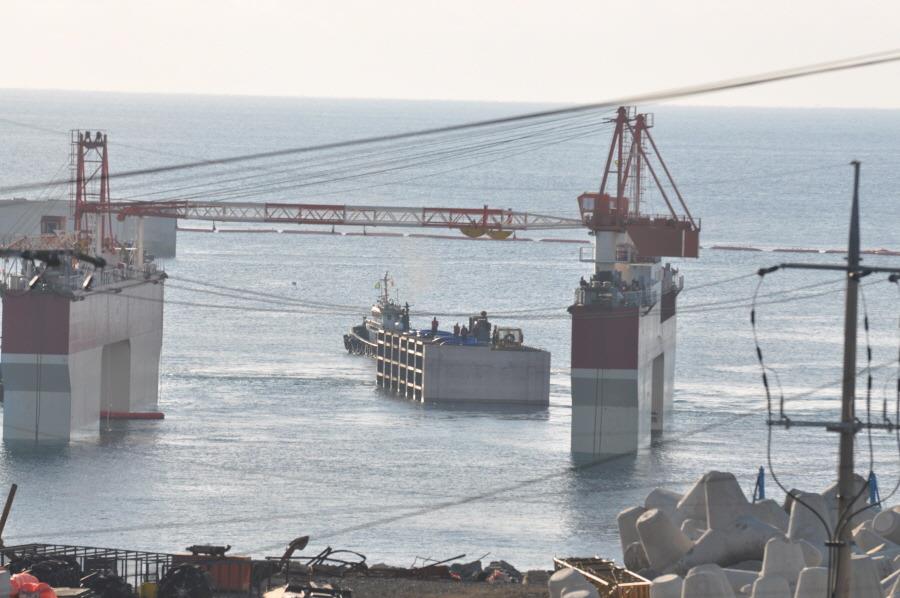
Caisson built by Daelim Co. is being put into Gangjeong sea in the morning of January 4. . . More photos by Hallabong, click here. (Post by Regina Pyon)
The Gangjeong village statement on Jan. 2, 2013
Position of the Gangjeong villagers on the subsidiary conditions on the 2013 Jeju naval base budget
(You can see the original Korean statement, here)
In the examination on the 2013 budget on the Jeju naval base project, the National Assembly passed the budget with the subsidiary condition (* See the bottom). The Gangjeong Village Association cannot but ask whether the National Assembly neglected its role as the monitoring institute on the government by itself to pass the whole budget(* 200 billion won) proposed by the Ministry of National Defense despite the fact that it is the project of which a thorough verification, the subsidiary condition agreed by the Budget and Balance committee of the National Assembly in 2011 has not been carried on.
However, we judge that the subsidiary conditions of 2013 budget is in fact a declaration on construction stop. We should consider the contents that [the Government] should not carry on the execution of budget until it satisfies the three conditions as the [demand] to the navy to stop the expense plan on the naval base budget first. However, the navy, enforcing 24 hour construction from the beginning of the Jan. 1, New Year, is staging conflicts with villagers and peace keepers. Even the Ministry of National Defense espoused a thorough performance on the subsidiary conditions through its press release. Therefore the navy’s obstinate enforcement of construction is an arrogation and insubordination.
The reasons that we should consider the subsidiary conditions as the construction stop in fact are as the below.
Firstly, it is because of the very first item of [the conditions] that reads that [the Government] should wipe out concerns that the base would be operated mainly for the military port.
According to the enforcement of decree on Protection of Military Bases and Installations Act revised in 2012, all the area of the Jeju naval base project is designated as the military protection (restriction) zone and the port-entry/ exit of the cruise ships should be permitted from the Unit commander.
Not only that, according to the decree revised, the whole crews and passengers are defined as the subjects to be controlled. How can there be a guarantee that the port will not be operated mainly for a military port when the law is defined as such?
To wipe out the concerns that the port would be mainly for a military port, at least the zone designated as a trade port should be excluded from the Military protection area.
The [next] government of Park Geun-Hye [whose being fairly elected is matter of suspicions] should examine the issue in a forward-looking manner and should revise again the revised enforcement of decree on Protection of Military Bases and Installations Act.
Secondly, it is for the [second] item that demands a through verification on the possibility of entry/exit of 150,000 ton cruise. To be sorry, the item is not stipulated with the phrase of ‘possibility on the 150,000 ton cruises’ smooth entry and exit of port.’ While ‘smooth entry and exit of port’ can mean that it is possible for the cruise to enter and exit the port by its own exertion, the definition of simply ‘a possibility of entry and exit of port’ brings about a serious matter. The cruse can enter the port with the support by more than 4 tug boats that would be mobilized, unless there is a warning on the high wind and sea wave.
However, it takes tremendous costs to manage a port that operates four tug boats of each is more than 3,000 HP. It is told that more than 150,000,000 won is needed only for an yearly wage for a captain of a tug boat. It is expected to take 4~5 billion won to operate a pilot for the arrangement of four tug boats.
If we are realistic to expect entries of 150,000 ton level cruise twice a year and the economic income would be about 0.6 billion won for one-time entry, it means the [Island Government] should operate a pilot with 4~5 billion won only for 1.2 billion economic income that would come from the entries of cruises twice a year. Further the costs of operation on waiting room for cruse and maintenance/ repair of harbor and bay will be additionally burdened. Moreover, the loss amount cannot but be more increased since the sources of direct earnings for the Jeju Island government will be merely of the ship cost for coming alongside the pier and entry ticket for the watching facility of the public institutes.
Even though we suppose smooth entry & exit of port by cruise (which means the possibility for the cruise to enter and exit by its own exertion), it is tremendous costs for the waiting room and harbor & bay-maintenance/repair that would be expended only for the 150,000 ton level cruise coming no more than twice a year. Plus with the expectation on the restoration costs following the damages by typhoons, the effect on the chronically deficient Jeju economy cannot but be aggravated far from positive effects on it. The Jeju naval base being constructed under the excuse of invitation of 150,000 ton cruises that are only 4~5 throughout the world will bring about the result that would push the economy of the Jeju more falling into its bottomless pit.
Even if we might suppose that the 2nd item of the subsidiary conditions of the National Assembly means the verification on the smooth entry/ exit of port for 150,000 ton cruises, the time-limited condition of 70 days makes no sense for a thorough verification.
It is because it is a simulation that should be processed premised on the altered 30° navigation route, which passes through the vicinity of the Beom Seom (Tiger Island) [the UNESCO Biosphere Reserve]. If then there should be a three-dimensional modeling on harbor and bay, backed by observation on area-detailed water depth and analysis on the current, regarding the water area near the 30° altered navigation route. According to experts, it is a work of which the process only takes three months at minimum to six months at maximum.
We have warned many times that the 30° navigation route and vicinity water area themselves would be the obstacles on the port-entry for 150,000 ton cruise since those places are of many reefs with low water depth. Moreover, the water area of train rock water area is a zone of tremendously strong current. Will there be anybody who can trust the verification if the verification on the opening of a navigation route in such area of natural environment is processed without basic investigation process and three dimensional modeling due to time limitation of 70 days?
Thirdly, it is on the matter on the conclusion on the protocol on the joint use on the rights to official regulations on the harbor and bay and on the costs for maintenance and repair on the harbor and bay facility.
Above all, it is illogical to say so and so on the rights to official regulations when the military legally holds the control rights on the port-entry and exit.
Regrading the costs on the maintenance and repair on the harbor and bay facility, it is also prospected that even the operation cost on the cruise waiting room could be hard to be met given the realistic numbers of the entry by 150,000 ton cruises even though cruse makes entry and exit by its own exertion. Plus with the costs on the maintenance and repair on the harbor and bay facility, the Jeju Island cannot but have the blame shifted to itself. The Jeju naval base built under the show of so called civilian-military complex port for tour beauty will be only a worry that destroys the economy of the Jeju, far from making the Jeju as the 2nd Hawai’i or the tourism herb of the Northeast Asia.
Even with the use of tug boats, the governor cannot but risk loss. If the governor still passes such project that deceives the Jeju Island people saying so and so on joint allotments, without an objective, scientific and thorough verification, he would pose himself as destroying the Jeju economy and threatening the people’s lives. He should keep in mind that he would be the public enemy for the Jeju Island people, then.
Park Geun-Hye, the President-elect, claiming the great unity of people, made a pledge that she would drive for the project to be a civilian-military complex port for tour beauty, following the will of the Island people. She also emphasized that she is a politician being responsible for her words. Then she should stop the construction on the Jeju naval base and carry on thorough verification and investigation on truth, following the subsidiary conditions that the Saenuri Party (* the ruling conservative party) agreed with. She should revoke the base construction project itself if it turns out that the Jeju naval base does not fit to the South Korea’s international relationship or to the position of the Jeju Island; and if it becomes clear that it is against the will of the Island people or harms the Jeju economy.
Therefore the Gangjeong Village Association demands as the below.
1, The National Assembly should switch over itself from the subjects of solution from the subjects of resolution. As the ruling and opposition parties made an agreement on the subsidiary conditions, they should take responsibility for management and supervision on the performance on the subsidiary conditions by forming a special committee. Park Geun-Hye, President-elect and the Saenuri Party should take an active cooperation with them as they made an agreement to the subsidiary conditions also.
2. As the Ministry of National Defense declared on the thorough performance on the subsidiary conditions of the National Assembly, the navy should immediately stop the construction and should enter for a thorough verification on scientific and reasonable verification with transparent and objective measures.
3. Woo Keun-Min, the Jeju Island governor should not compromise on the Jeju naval base issue which is the biggest matter and core of conflict in the Jeju Island. He should fulfill a thorough verification to the end.
Finally, greeting the beginning of 2013, the Gangjeong village Association, the representative institute of the Gangjeong village, states again that it will firmly maintain its position to revoke the naval base project, that has experienced conflicts for the Jeju naval base issue for six years; and will make all the efforts for construction stop and re-examination of the project, while fulfilling its role as the subject of dissolution on conflict and restoration on community.
Jan. 2, 2013
The Gangjeong Village Association
…………………………………………………..
Post by Fox David
Image source: Jeju Sori, Jan. 1, 2013
[Final Updates] Republic of Korea’s national assembly passed the bugdet bill for 2013 fiscal year and confirmed the naval base constuction budget scale and it’s collateral conditions.
A meeting was achieved between the leaders of both parties just before a general session of national assembly and made final agreement between the leadership of both party. They made an agreement and concluded they attached some collateral conditions to the 2013 naval base construction budget bill. The collateral conditions are shown on this photo. This is an agreement between the leadership of the rulling party and the opposite party and signed by the representatives from both parties.
——————————————————————————————–
Jeju Naval Base(Jeju Civilian-Military Complex Port for Tour Beauty) Additional Agreements
1. The Ministry of National Defense should try dispel worries about the controversies this Jeju Civilian-Military Complex Port might be used as 100% military installation.
2. The Ministry of National Defense, The National Assembly, The Central Government and Jeju Special Self-governing Province Authority should take a deep verification and an investigation process about the capacity of Jeju Civilian-Military Complex Port for the entry and departure procedures of 150 thousand tons Cruise Ship.
3. The Ministry of National Defense should make an written agreement about the control of Jeju Civilian-Military Complex Port, the responsibilities of maintenance with the Jeju Special Self-governing Province Authority.
The above three collateral conditions should be satisfied and executed within 70 days [from the date of signing] and should be reported to the National Assembly within 70 days. If the agreement of the hearing schedule from the National Assembly weren’t made, a written report can be submitted to the National Assembly.
Additionally, the National Assembly can have an authority to split the naval base construction budget into two part, the Defense Acquisition Program Administration’s Budget and the Ministry of Land, Transport and Maritime Affairs’ one so there can be better collaborations and cooperation for the full functionality and capacity as a Civilian-Military Complex Port.
The floor leader of the ruling SAENURY Party
LEE, HAN GOO
The floor leader of the opposition DUP(Democratic United Party)
PARK, KI CHUN




